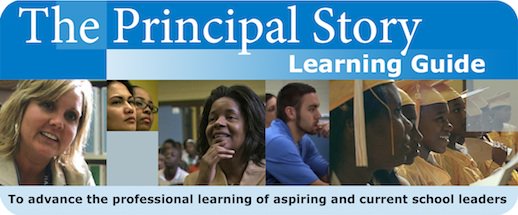The Principal Story Learning Guide
School leadership matters. During the past decade, there has been a growing recognition among educators and policymakers that school principals must be instructional leaders who ensure that high-quality teaching occurs in every classroom. This view is backed up by a solid body of evidence showing that leadership places second only to teaching among school-related influences on learning.

In culling lessons from 13 years of research that describes what effective principals do well, The Wallace Foundation has found they perform five key practices:
- Shaping a vision of academic success for all students
- Creating a climate hospitable to education
- Cultivating leadership in others
- Improving instruction
- Managing people, data, and processes to foster school improvement
Learning Forward has developed this web-based professional learning guide using excerpts from the award-winning PBS documentary film, The Principal Story, to illustrate the five practices. The guide is intended to help those who prepare and support aspiring and current principals probe these essential practices. Use this facilitator guide to explore options for using these tools.
Watch excerpts from the film here and explore each practice below.
The five units below, each based on a key practice of effective principals, guide learners so they will be able to read the research, discuss the practices, view the film clips, and complete a range of activities as individuals or in groups.
Researchers who have examined education leadership agree that effective principals are responsible for establishing a schoolwide vision of commitment to high standards and the success of all students. This unit gives participants an opportunity to assess their own attitudes, identify relevant principal behaviors, and apply that knowledge.
Research suggests that effective principals ensure that adults and children can focus on learning every day. These activities guide participants in identifying relevant principal behaviors and reviewing research through the lens of their own experiences.
Research tells us that when principals share leadership, workplace settings and relationships improve and student achievement increases. These materials give participants an opportunity to examine research and their own experiences to identify relevant principal behaviors and apply that knowledge.
We know from research that learning-focused principals help teachers improve their practice either directly (e.g. walk-throughs, formative evaluation) or with the aid of other school leaders such as department chairpersons. These tools allow participants to draw on their own experiences and review research to identify essential actions and apply that knowledge.
Researchers who studied effective principals found they are prudent managers who make the most of their resources, including time. They also use data to ask useful questions, tell compelling stories, and encourage collaborative inquiry. This unit guides participants in considering the research about relevant principal behaviors, and in applying that knowledge.

